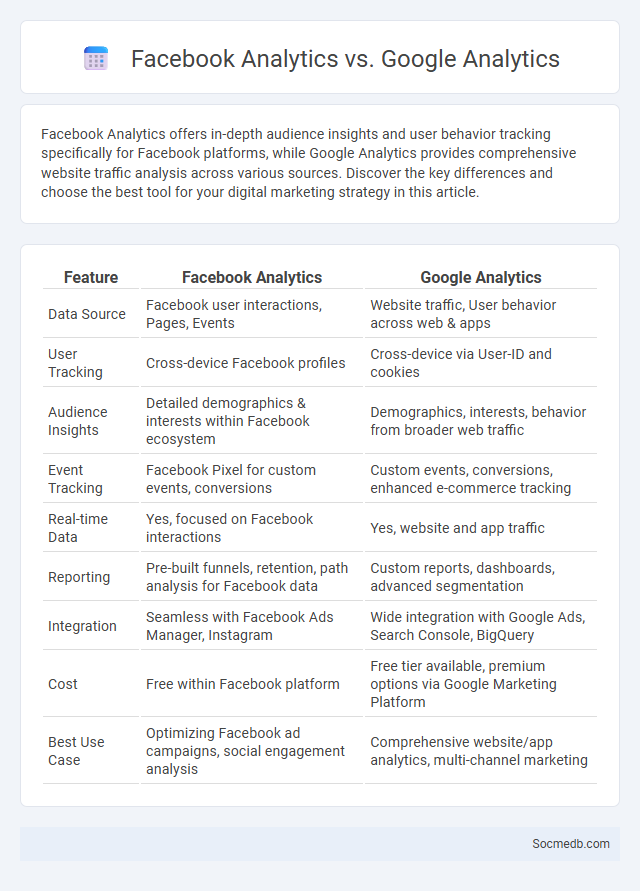
Photo illustration: Facebook Analytics vs Google Analytics
Facebook Analytics offers in-depth audience insights and user behavior tracking specifically for Facebook platforms, while Google Analytics provides comprehensive website traffic analysis across various sources. Discover the key differences and choose the best tool for your digital marketing strategy in this article.
Table of Comparison
| Feature | Facebook Analytics | Google Analytics |
|---|---|---|
| Data Source | Facebook user interactions, Pages, Events | Website traffic, User behavior across web & apps |
| User Tracking | Cross-device Facebook profiles | Cross-device via User-ID and cookies |
| Audience Insights | Detailed demographics & interests within Facebook ecosystem | Demographics, interests, behavior from broader web traffic |
| Event Tracking | Facebook Pixel for custom events, conversions | Custom events, conversions, enhanced e-commerce tracking |
| Real-time Data | Yes, focused on Facebook interactions | Yes, website and app traffic |
| Reporting | Pre-built funnels, retention, path analysis for Facebook data | Custom reports, dashboards, advanced segmentation |
| Integration | Seamless with Facebook Ads Manager, Instagram | Wide integration with Google Ads, Search Console, BigQuery |
| Cost | Free within Facebook platform | Free tier available, premium options via Google Marketing Platform |
| Best Use Case | Optimizing Facebook ad campaigns, social engagement analysis | Comprehensive website/app analytics, multi-channel marketing |
Introduction to Digital Analytics Platforms
Digital analytics platforms provide comprehensive tools to analyze social media performance, tracking key metrics such as engagement rates, click-throughs, and audience demographics. These platforms enable you to measure the effectiveness of your campaigns in real time, optimizing content strategies to increase reach and conversion. Leveraging insights from digital analytics helps you make data-driven decisions, enhancing your brand's online presence and return on investment.
Overview of Facebook Analytics
Facebook Analytics provides comprehensive insights into user behavior, engagement metrics, and conversion rates across your pages and apps. The platform tracks data such as active users, session duration, and revenue, enabling you to optimize marketing strategies effectively. Using these detailed reports helps you understand your audience's preferences and improve your content performance.
Overview of Google Analytics
Google Analytics provides detailed insights into social media traffic by tracking user behavior, engagement, and referral sources from various social platforms. Key metrics include session duration, bounce rate, and conversion rates, which help businesses optimize marketing strategies and improve ROI. Integration with Google Ads and social media channels enables comprehensive performance analysis and targeted audience segmentation.
What Is ‘Analytics’ in a Broad Sense?
Analytics in social media refers to the systematic collection, measurement, and analysis of data from various platforms to understand user behavior and content performance. It involves tracking metrics such as engagement rates, reach, impressions, and conversions to optimize marketing strategies and improve audience targeting. Utilizing tools like Facebook Insights, Twitter Analytics, and Instagram Insights helps businesses make data-driven decisions for enhanced social media impact.
Key Features Comparison: Facebook vs Google Analytics
Facebook offers robust social media marketing tools including audience targeting, content sharing, and engagement metrics, enabling Your brand to connect directly with users through posts, ads, and interactive features. Google Analytics excels in tracking and analyzing website traffic, providing deep insights into user behavior, conversion rates, and real-time data that optimize your digital marketing strategies. Comparing key features reveals Facebook's strength in social interaction and ad targeting, while Google Analytics focuses on performance analysis and user journey measurement.
Data Collection Methods and User Tracking Differences
Social media platforms use various data collection methods such as cookies, pixel tags, and browser fingerprinting to gather detailed user information. Your activity is tracked differently across platforms; some rely on real-time behavioral analysis, while others aggregate historical data for targeted advertising. Understanding these differences helps you better manage privacy settings and control the extent of your personal data exposed online.
Reporting Capabilities and Customization
Social media platforms offer robust reporting capabilities that allow you to analyze engagement metrics, audience demographics, and content performance in real time. Customization options enable tailoring dashboards and reports to suit your specific business goals, enhancing the strategic adjustment of campaigns. Leveraging these tools ensures your social media efforts are data-driven and highly effective in reaching target audiences.
Integrations and Third-Party Support
Social media platforms offer extensive integrations and third-party support to enhance your user experience and streamline content management. Popular tools like Hootsuite, Buffer, and Zapier enable seamless scheduling, analytics, and cross-platform posting, boosting engagement and efficiency. These integrations empower your business to automate workflows and connect with various marketing and CRM systems effortlessly.
Use Cases: When to Choose Each Platform
Instagram excels for visually-driven campaigns, leveraging high engagement through stories, reels, and influencer partnerships to target younger demographics. LinkedIn is ideal for B2B marketing, professional networking, and thought leadership, enabling precise audience targeting based on industry and job role. Twitter suits real-time updates, customer service, and trending conversations, offering fast interaction and broad reach for news, events, and brand engagement.
Conclusion: Which Analytics Solution Is Best for You?
Choosing the best social media analytics solution depends on your specific goals, budget, and preferred platform integrations. Tools like Google Analytics excel in tracking website traffic from social media, while Hootsuite Analytics offers comprehensive monitoring across multiple channels. Your ideal choice balances detailed insights, real-time data, and user-friendly interfaces to effectively measure and optimize your social media performance.
 socmedb.com
socmedb.com